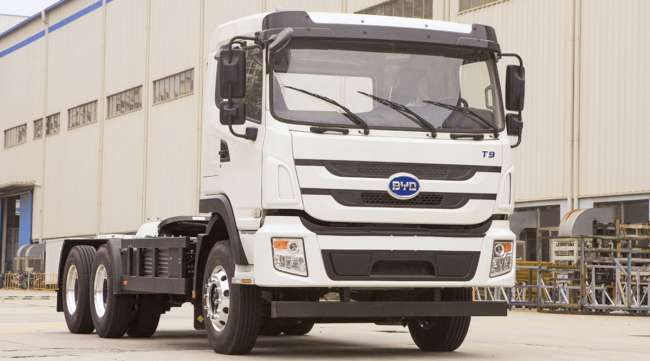Extreme Temps Affect Electric Truck Batteries

There’s no turning back the clock on the electrification of Class 8 trucks. All major truck builders and several startups are preparing to develop, test and market either battery-electric vehicles or fuel-cell/battery models in the very near term.
Replacing diesel-powered Class 8 trucks, though, will present numerous challenges to an industry accustomed to proven and reliable diesel-engine technology.

Romba
Largest among those concerns may be the effects Mother Nature has on lithium-ion batteries. These zero-emissions trucks could become expensive, part-time haulers when extreme ambient temperatures reduce battery performance and capacity.
The experience of electric cars this past winter raised that issue.
Lithium-ion-powered passenger cars experienced a significant drop in range during the January storm this year that brought frigid temperatures to northern U.S. states. Reported temperatures fell to minus 30 to minus 40 degrees Fahrenheit, and wind chill estimates put the effects of cold and wind at minus 60 degrees.
I was told by truck makers that temperature extremes, both cold and hot, affect the performance of batteries in electric trucks by reducing their range. In addition to temperature extremes, the operation of systems to enhance driver comfort — namely heating and air conditioning — can reduce range as well.
Gary Horvat, vice president of eMobility for Navistar International, pointed out one rule of thumb for batteries and temperatures. “Batteries like to live in temperatures like people,” he said. “They don’t like temperatures below 50 degrees (F) or above 100.” Horvat joined Navistar from Proterra, which manufactures electric transit buses.
Outside of those temperatures, batteries can deliver or absorb only a little energy, which can dramatically affect performance of the vehicle, according to Brian Lindgren, director of research and development at Kenworth Truck Co.
Industry experts at Nikola Motor Co., Volvo Trucks North America, Mack Trucks and Daimler Trucks North America agree that cold temperatures slow the chemical reaction that creates electricity.
Nikola CEO Trevor Milton warned that not charging a battery-powered truck in cold weather could lead to an extended time to warm the batteries in order to use the vehicle. The company is developing a hydrogen fuel-cell Class 8 truck that also will incorporate lithium-ion batteries.
“If you soak those batteries overnight in cold temperatures, it can take 30-plus minutes to heat the batteries enough to use the truck,” he said. “To ensure the ability to drive the vehicle with full torque and power available, the batteries need to be on the warm side of about 80 degrees F.”
Richelle Carkin, marketing and communications manager for eMobility at Daimler Trucks North America, explained that cold batteries must be charged correctly to avoid battery life degradation. On the other end of the temperature scale, the life and performance of batteries can be affected when they are too warm. In that situation “certain side-reactions occur that cause a breakdown of the chemical compounds inside the battery. Each time a side-reaction occurs, battery life reduces a small amount,” she said. “Very high temperatures in the battery can cause the reactions to happen very quickly and could result in thermal runaway.”
Due to the fluctuations in battery performance, truck makers said “robust” battery management systems are critical.
According to Roy Horton, director of product strategy for Mack Trucks, battery pack thermal management is accomplished using a liquid cooling system “to help maintain optimal battery pack temperatures to maximize their performance.”
Truck makers could use a water jacket around the battery pack. “When batteries are hot, you run cold water through it and when batteries are cold, you run warm water,” Navistar’s Horvat said.
Another approach to warm batteries would employ a resistance heater underneath them, according to Horvat. Also when being charged, batteries can be warmed. An approach to cool batteries could tap into the refrigeration system used for cab air conditioning.
Horvat said the larger battery packs such as those needed for Class 8 trucks experience fewer temperature fluctuations compared with passenger cars.
Powering Class 8 trucks with batteries or a fuel-cell-battery powertrain won’t be as simple as using batteries to power a flashlight or clock. The electric power will require new or modified accessory systems to maintain battery performance in all operating temperatures.
Phil Romba has covered trucks and truck maintenance as a full-time journalist and worked as a public relations manager for Volvo Trucks North America during his more than 20-year career in the industry.




